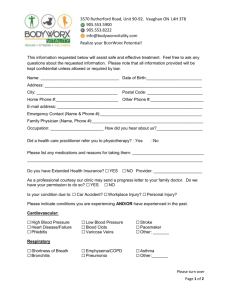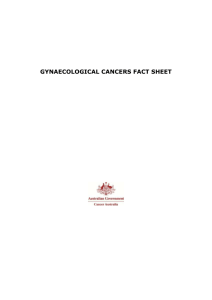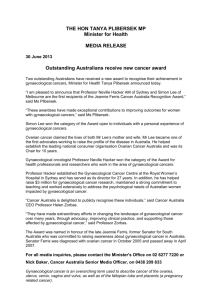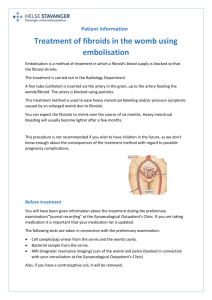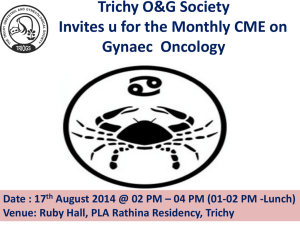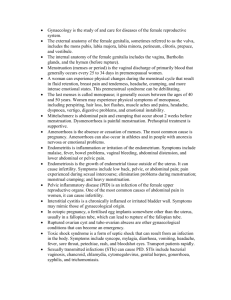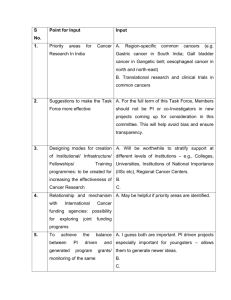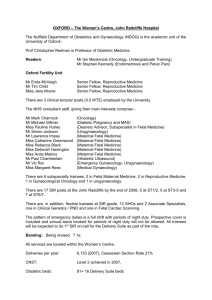Why `vagina` should be part of every young woman`s vocabularly
advertisement
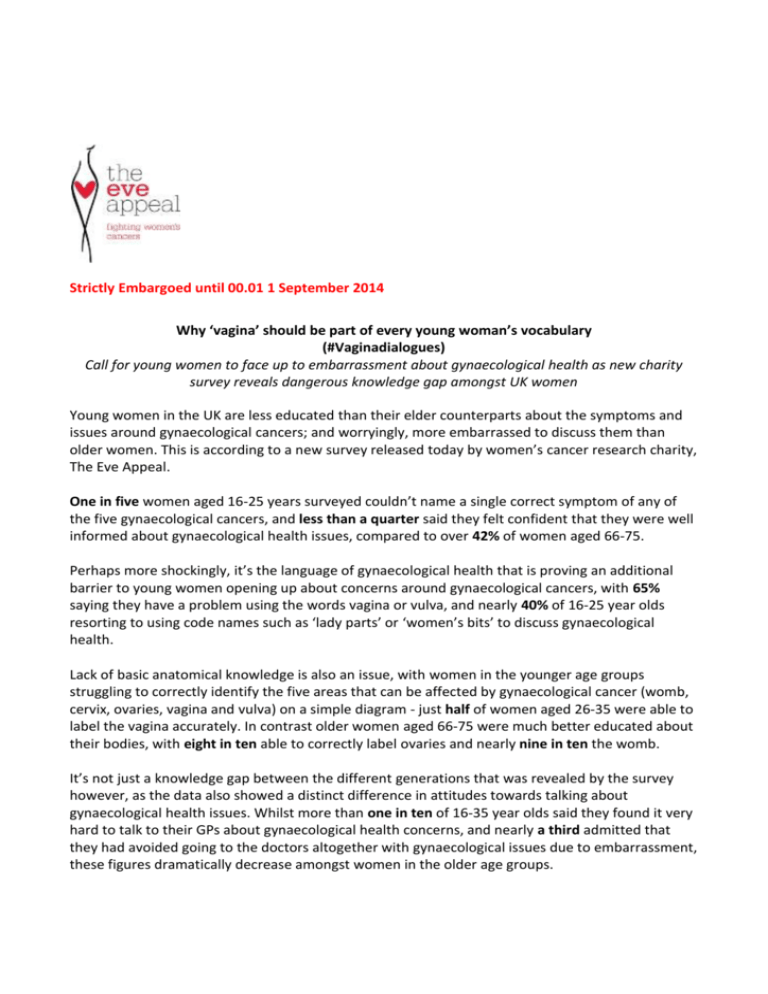
Strictly Embargoed until 00.01 1 September 2014 Why ‘vagina’ should be part of every young woman’s vocabulary (#Vaginadialogues) Call for young women to face up to embarrassment about gynaecological health as new charity survey reveals dangerous knowledge gap amongst UK women Young women in the UK are less educated than their elder counterparts about the symptoms and issues around gynaecological cancers; and worryingly, more embarrassed to discuss them than older women. This is according to a new survey released today by women’s cancer research charity, The Eve Appeal. One in five women aged 16-25 years surveyed couldn’t name a single correct symptom of any of the five gynaecological cancers, and less than a quarter said they felt confident that they were well informed about gynaecological health issues, compared to over 42% of women aged 66-75. Perhaps more shockingly, it’s the language of gynaecological health that is proving an additional barrier to young women opening up about concerns around gynaecological cancers, with 65% saying they have a problem using the words vagina or vulva, and nearly 40% of 16-25 year olds resorting to using code names such as ‘lady parts’ or ‘women’s bits’ to discuss gynaecological health. Lack of basic anatomical knowledge is also an issue, with women in the younger age groups struggling to correctly identify the five areas that can be affected by gynaecological cancer (womb, cervix, ovaries, vagina and vulva) on a simple diagram - just half of women aged 26-35 were able to label the vagina accurately. In contrast older women aged 66-75 were much better educated about their bodies, with eight in ten able to correctly label ovaries and nearly nine in ten the womb. It’s not just a knowledge gap between the different generations that was revealed by the survey however, as the data also showed a distinct difference in attitudes towards talking about gynaecological health issues. Whilst more than one in ten of 16-35 year olds said they found it very hard to talk to their GPs about gynaecological health concerns, and nearly a third admitted that they had avoided going to the doctors altogether with gynaecological issues due to embarrassment, these figures dramatically decrease amongst women in the older age groups. These findings are in direct contrast with the popular misconception that society is more open these days, making it much easier for women of younger generations to talk about gynaecological health. Nearly three quarters of all women surveyed across every age group agreed with this statement, and over 60% said they thought that young women knew more about gynaecological health than older women. Helena Morrissey, Chairman of The Eve Appeal commented: “At the Eve Appeal we know how important it is to promote straight talking about the signs and symptoms of gynaecological cancers to women of all ages, and this survey has highlighted just how far we still have to go to make this happen. “These cancers have some of the worst outcomes for women, with a 40% mortality rate. Understanding the symptoms will save lives, which is why we are urging women this Gynaecological Cancer Awareness Month to talk more openly about these life-saving issues.” With the survey results showing that over half of women (51%) would find it easy to talk to their female friends about gynaecological health concerns, and more than a third (34%) saying the same of their sister, The Eve Appeal is encouraging women to get together this GCAM and visit www.eveappeal.org.uk to learn more about the risks and symptoms of gynaecological cancers, as well as sharing their knowledge and experiences. Currently 55 women are diagnosed with a gynaecological cancer every day in the UK, making GCAM 2014 the perfect time to increase awareness of the need for greater understanding of this issue amongst women of all generations. For more information about Gynaecological Cancer Awareness Month (GCAM) visit www.eveappeal.org.uk. ENDS Eve Appeal contact: Liz Engel, liz.engel@eveappeal.org.uk Mob: 07812 150832 Press contact: please call Nina Doehmel at Kindred Agency (020 7010 0854) or Carrie Greene (020 7010 0819 nina.doehmel@kindredagency.com / carrie.greene@kindredagency.com Notes for Editors: Case study synopsis 1: Carmel Wood (Cervical Cancer) My problems started while on holiday back in Sept 2007 when I started fainting, constantly feeling ill and I didn't have any appetite. Initially I ignored the symptoms, assuming they were caused by an existing overactive thyroid condition, but I soon realized that I needed to see my GP when I got home. 2 At the surgery she reminded me that I was overdue for a cervical screening test. I’d had a few gynaecological problems in the past so she booked me in to see the nurse just to make sure. About two weeks later I received the letter telling me that they had found abnormal cells on my cervix and that I needed laser treatment. This warning came just in time as during the laser procedure under local anaesthetic they discovered pre-cancerous cells had spread over 75% of my cervix. It was daunting waiting for the results, and not even daring to dream about the future, especially the possibility that I may not be able to have children. Fortunately all was well. All the cells had been removed and I was given the all clear. I now have precautionary screening every year and am passionate about making sure other women are regularly screened. What the doctors can do now is just so amazing. I was lucky, my doctor specialised in gynaecological cancers, and she was just fantastic, I couldn't have asked for a better medical team. Case study synopsis 2: Phee Garlick (Ovarian Cancer) Diagnosed with ovarian cancer at the unusually young age of fifteen I have now spent over 10 years living with ovarian cancer. I have never allowed it to influence my choices though. If anything, it has made me more determined to make the most of every moment and every opportunity. I was just 15 and on holiday when the first stomach cramps hit. When the pain became unbearable, my GP advised further investigation. Appendicitis was suspected but the hospital arranged an ultrasound scan which revealed a twisted ovarian cyst. Two weeks after the cyst was removed I learned that it was cancerous. A second operation removed the ovary and, as my specialist was entirely confident that no traces of cancer remained, I didn’t need chemotherapy but was put on a ten-year observation programme involving blood tests, x-rays, CT scans and MRI scans. The frequency of the tests has decreased over time, and I am now looking forward to a cancer free future. During the observation programme I finished my schooling, completed an anthropology degree, travelled extensively and volunteered abroad. A cancer diagnosis is scary but there is definitely hope for an exciting future; we just need to make sure we are aware of our own bodies and when something just doesn’t feel right. I am now married with a 10 month old daughter of my own and working as a primary school teacher. Featured case studies are available for interview on request. If you would like further information on either of these, or similar case studies from The Eve Appeal, please get in touch. About The Eve Appeal 3 The Eve Appeal was set up to save women’s lives by funding groundbreaking research focussed on developing effective methods of prediction, detection, treatment and care of gynaecological cancers. The Eve Appeal has grown and developed in parallel with the Department of Women’s Cancer at University College London (UCL) and has played a crucial role in providing seed funding, core infrastructure funding and project funding in addition to campaigning to raise awareness of women-specific cancers. Much work remains to be done and the kind of support provided by The Eve Appeal is vital in funding targeted research where it can save the most lives. The world-leading research that we fund is complicated and challenging but our vision is simple: A future where fewer women develop and more women survive gynaecological cancers. Gynaecological Cancers There are five gynaecological cancers – ovarian, cervical, womb, vulva and vagina. Together, these cancers are the world’s fourth largest cancer killer of women. Every year one million women worldwide are diagnosed with a gynaecological cancer –just 200,000 fewer than the number who are diagnosed with breast cancer - and over 850,000 women die. In the UK there are over 20,000 new cases of gynaecological cancer per year and over 7,600 deaths. This equates to 55 women per day receiving the agonizing news of a diagnosis of a gynaecological cancer and 21 families organizing a funeral for a woman they love. Despite these grim statistics, gynaecological cancer remains an under-funded and underprofiled cause. The Eve Appeal is determined to change this. Notes on the survey The survey was conducted by One Poll in July 2014 and questioned 1,000 women of different ages from across the UK. 4
